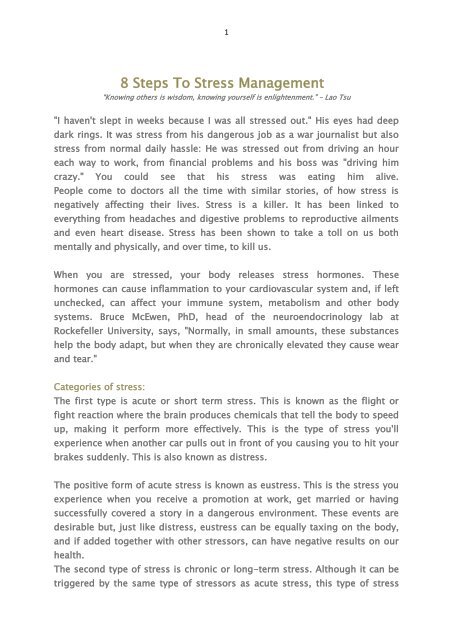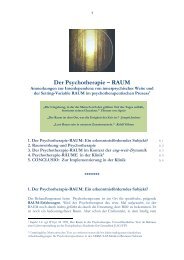8 Steps To Stress Management - Matthias Witzel
8 Steps To Stress Management - Matthias Witzel
8 Steps To Stress Management - Matthias Witzel
Create successful ePaper yourself
Turn your PDF publications into a flip-book with our unique Google optimized e-Paper software.
18 <strong>Steps</strong> <strong>To</strong> <strong>Stress</strong> <strong>Management</strong>“Knowing others is wisdom, knowing yourself is enlightenment.” – Lao Tsu"I haven't slept in weeks because I was all stressed out." His eyes had deepdark rings. It was stress from his dangerous job as a war journalist but alsostress from normal daily hassle: He was stressed out from driving an houreach way to work, from financial problems and his boss was "driving himcrazy." You could see that his stress was eating him alive.People come to doctors all the time with similar stories, of how stress isnegatively affecting their lives. <strong>Stress</strong> is a killer. It has been linked toeverything from headaches and digestive problems to reproductive ailmentsand even heart disease. <strong>Stress</strong> has been shown to take a toll on us bothmentally and physically, and over time, to kill us.When you are stressed, your body releases stress hormones. Thesehormones can cause inflammation to your cardiovascular system and, if leftunchecked, can affect your immune system, metabolism and other bodysystems. Bruce McEwen, PhD, head of the neuroendocrinology lab atRockefeller University, says, "Normally, in small amounts, these substanceshelp the body adapt, but when they are chronically elevated they cause wearand tear."Categories of stress:The first type is acute or short term stress. This is known as the flight orfight reaction where the brain produces chemicals that tell the body to speedup, making it perform more effectively. This is the type of stress you'llexperience when another car pulls out in front of you causing you to hit yourbrakes suddenly. This is also known as distress.The positive form of acute stress is known as eustress. This is the stress youexperience when you receive a promotion at work, get married or havingsuccessfully covered a story in a dangerous environment. These events aredesirable but, just like distress, eustress can be equally taxing on the body,and if added together with other stressors, can have negative results on ourhealth.The second type of stress is chronic or long-term stress. Although it can betriggered by the same type of stressors as acute stress, this type of stress
3need to learn some new skills? Do you need extra resources? Do you need totalk to your boss? Do you need to switch to decaf or alcohol-free beer?3. Protection: Avoid stress infected individuals and environments,create a “safe place”Overly stressed people are infected with stress germs and they spread themaround indiscriminately. Soon, before you know it, you are infected too!Protect yourself by recognizing stress in others and limiting your contactwith them. Or if you've got the inclination, play stress doctor and teach themhow to better manage themselves. Necessarily organize yourself a secureenvironment, a “safe space” for your daily regeneration and relaxation.Exercise 1: Draw a so called “social-atom”: Make a list including all people inyour social world ( family, friends, colleagues, co-workers): Honestlydiscriminate between people who by the majority take your energy and whoby the majority deliver energy.Exercise 2: Install and furnish a “safe place” for relaxation and recreation athome.4. Learning by modeling: Model calm peopleModeling is a way of making yourself into the type of person you want to be.So model calm people, people who seem to naturally handle stress well.Exercise: Take some hours and observe and monitor people around you.Identify calm and relaxed people and study their reactions and behavior.When people around you are losing their head, who keeps calm? What arethey doing differently? What is their attitude? What are they saying to others?What are they saying to themselves? Have they been trained in stressmanagement? What experiences have they had? You might watch them or,better yet, sit them down and talk with them. Ask them how they cope withthe things that seem to stress everyone else out. Learn from the best andmodel what they do.5. Relaxation: Breath, really breatheI can assure you, you can't stay calm unless you control your breathing. Thegood news for all stressed people is they can trick their body into relaxingsimply by using deep breathing techniques.
4Exercise: An example for a very simple but highly effective breathingtechnique: Breathe in slowly through your nose for a count of three and thenbreathe out for a count of seven. Pause for one or two counts (feel thestillness for a moment). Repeat the 3-7-pause-breathing for a minute or soand your heart rate will slow, your sweaty palms will dry and things will startto feel more normal.Deep breathing techniques can definitely help to reduce stress levels.6. Thinking pattern: Cancel stress provoking thoughtsDo you sometimes hear yourself saying, "If this happens, then that mighthappen and then we're all up the creek!" Then, when you look back on it all afew days later, you find you stressed yourself for no reason? Sure, we all do.Most of these types of things never happen. So why waste all your energyworrying needlessly. Now this isn't saying don't think problems through.Good planning means thinking about different possibilities and then decidingon the best course of action. But once you've made your decision, see itthrough and trust that if another decision needs to be made you can make it.These types of thoughts give you F.E.A.R. (False Evidence Appearing Real) Ifyou find yourself being tangled up in a stress knot by these types ofthoughts you can gain control. See them for what they are and make thedecision to focus on what you want, rather on these types of fears.Since many of us have been programmed to focus on the negative ratherthan the positive, you might want to try meditation or specific stressmanagmement techniques to control your focus, respective your mind.Recognize that thinking is a tool you have. It is not who you are. Who you areis much more powerful than the thoughts you have, and even words areinadequate to describe your true essence.Exercise: Take every day 5 minutes and deploy your thinking faculties moreconsciously. Observe your thinking habits: In other words, consciouslychoose to think as opposed to suffering involuntary thought. Identify threetypical sorrowful thoughts you often reiterate habitually.7.Self-Care: Take Care of YourselfLack of sleep, poor diet and no exercise wreaks havoc on our bodies andminds. If you only get five hours of sleep a night you double your chance ofdying of a heart attack. The same goes for eating fast food and forgetting toexercise. Just like your car needs good fuel, you need good food for your
5body to run properly. Just like your car needs regular maintenance, yourbody needs exercise to maintain it in good working shape. If you really wantto reduce your stress, take a good look at your lifestyle because these arethings within your control.Exercise: Have an honest and precise look at your lifestyle. Ask yourself: Howbalanced is my life? How aligned is my lifestyle? Review the followingcategories according your physical situation honestly: Sleeping, eating,personal hygiene, health care, exercises, time with beloved persons and forintimacy, sexuality; also, have a look at: time to be with yourself, relaxation,meditation/praying etc. <strong>To</strong> ensure that your chosen life-style works for you,make an assessment and write down for each category how success wouldlook like for you in that area, within a choosen time horizon (e.g. 6 months)8. Prensence: Live as if it is your last dayAn old saying entitles: Life is not measured by the number of breaths youtake, but the moments that take your breath away. We all have an expirationdate, this could be tomorrow. With so much business and dealing with stresstaking up our time and energy, the fundamental question to keep at theforefront of our minds is: “How can we live each day to its fullest extent?”Exercise: Imagine that some higher power came to you and said: “<strong>To</strong>day isyour last day on earth. Whether or not you live another day or severaldecades will depend on how fully and joyously you live today.”As you ponderthis scenario, let me ask you: How would you live your last day? Who wouldyou choose to spend the day with? What would you do? Where would you go?What thoughts would you think? Would you worry and stress around aboutthe same things that you typically do? Would you so some of the thing thatyou have always wanted to do but never had the time and/or courage to do?(see also: R. Devan, 2009)Live this given day as if it were the ultimate gift. Don’t hold anything back. Beeven more. Do even more. Live even more. This will enable you to achieveand sustain a less stressful, a more integrated and holistic life.Review:So let's review quickly: First, remember that you have to be aware of thesymptoms of chronic stress. Second, know what sets you off. Third, stayaway from the stress-infected and install a “safe place”. Fourth, find calmpeople and model their behaviors. Fifth, learn to breathe, really breathe.
6Sixth, Cancel stress-provoking thoughts and understand the things thatcause you to react. Seventh, take care of yourself and eighth, live each day toits fullest extent.There you are, eight (not always) easy ways to help you manage stress.<strong>Matthias</strong> <strong>Witzel</strong>, April 2011




